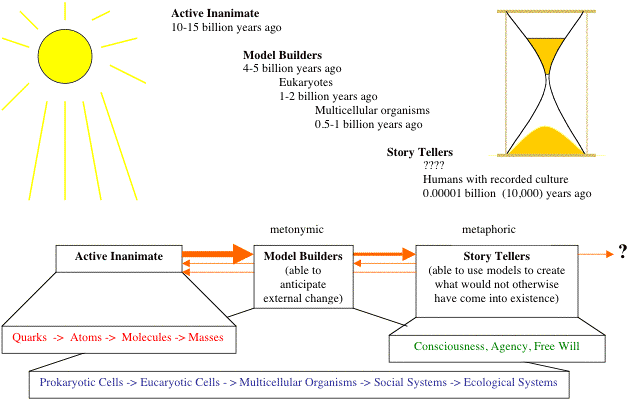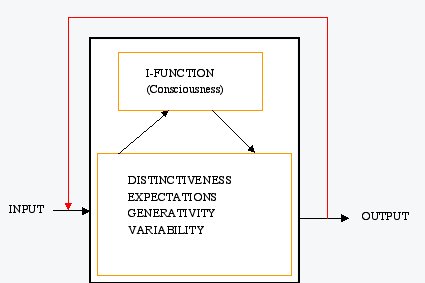Emerging Emergence, A Report on Progress (October 2002-present):
From the Active Inanimate to Models to Stories to Agency
(and Back Again)
Paul Grobstein
29 January 2004
(for October 28, 2004 update click here)
What's being reported on ...
Emergence = a perspective and story-telling genre that is distinctively characterized by efforts to make sense of observations on the presumption that there is no architect, planner, or intentional "first mover" (one anticipating future outcomes) nor need there be any conductor.
Criteria for evaluation ...
From Emergence Group On Line Forum (emphasis added):
Name: Paul Grobstein
Username: pgrobste@brynmawr.edu
Subject: theory and ... ?
Date: 2003-11-11 14:46:43
Message Id: 7198
Comments:
Rich session this morning. Thanks to Anne and everybody else involved in the conversation.
A quick thought growing from it and Doug's comment following Mark's posting:
Theory = "story", and both ALWAYS have the property that they will eventually prove to be inadequate descriptors of observable phenomena (see Getting It Less Wrong, The Brain's Way and A Vision of Science (and Science Education) in the 21st Century: Everybody "Getting It Less Wrong" Together).
Hence, the key question when one first hears a story should not be, is it wrong? That it will eventually be shown to be is a given. The first question should always be "is it useful? does it take one in new and potentially productive directions?" Once one has figured out the usefulness of a story, THEN one goes on the its limitations (its inevitable "wrongness") in search of the next story (theory).
"Emergence" may, in the abstract, never have a completely explanatory theory (and can't, in fact, if, as we collectively tend to believe, it is constantly generating new and unpredictable observations). On the other hand, aspects of emergence do in fact yield useful theories/stories, as we've been productively engaged in finding out. What seems to me particularly interesting/potentially instructive in the present case is the rhizome/semi-lattice distinction, and its link back to the structure of small world networks.
Artifacts (see Appendix for details) ...
- top down causation - stigmergy
- irreversibility (5 + 3 -> 8)
- loopiness
- randomness
- thermodynamics
- agency
- levels of organization (plurality of worlds)
- homeostasis
- small world networks
- level 1 - surprising given human pattern detectors
- level 2 - "suprising" (depends on randomness)
- homeostasis, agency a result of randomness, stigmergy ... and TIME (and selection?)
Summary of Conclusions (see Detailed Report for elaboration) ...
"Emergence" is the current name of a way of making sense of the world that has existed at least since the Greeks (and probably before that). Recently, particularly in the later part of the twentieth century and continuing into the present, this perspective has become explosively successful in making sense of a host of particular phenomena, as well as at showing commonalities among what are thought from other perspectives to be quite different phenomena requiring quite different explanations.
I have recently found the emergence perspective to be most useful in its integrative mode, and believe over the past two years significant progress has been made in outlining a plausible and generative story that starts with the "active inanimate" and links it via living things and their general "model making" capacity to the human capability for "story-telling" and "agency", without the need for any organizing forces outside the realm of matter, energy, and information (which can be understand as organizations of matter and energy). A noteworthy aspect of this synthesis is that "story telling" underlies "agency", which in turn can bring into being things that would not otherwise have existed.
Yes, "emergence" could be "everything", but that doesn't make it less interesting. It is useful to distinguish within "emergence" several different, interdependent levels of phenomena
- higher order properties that follow easily from lower order ones for humans and have a time stamp on them (can be calculated for any point in time from an equation in which time is a parameter)
- higher order properties that "surprise" humans and have a time stamp on them
- higher order properties that "surprise" humans and don't have a time stamp on them (can be calculated only iteratively) but are deterministic
- higher order properties that would "surprise" anyone (are non-deterministic)
And to distinguish between two forms of "entities", those that are not and those that are affected in their internal organization by their actions and the actions of other agents. The latter are "model-bulders", ie their internal organization is reflective of history and able to anticipate change.
And to distinguish between two kinds of "top down" interactions: those reflecting "stigmergy" in which the top-down influence is simply the accumulated resultant of agent actions and those reflecting "agency" in which the top-down influence is itself an autonomous and purpose agent. "Story-tellers" fall into the latter group.
These perspectives not only suggest ways to organize forms of "emergence" but also use suggest ways that unplanned and undirected behavior may be limited and so provide a clearer (if somewhat surprising) picture of the role of architects and conductors: they serve to create possibilities that would not otherwise exist.

The "active inanimate" (and its products) ARE part of "emergence"
"Emergence" exists at multiple levels, with each building on the preceding
- First 5/6 could in principle be accounted for without appeal to differential reproductive success/completition - simply random "exploration", expansion with left wall effect? And shows interesting accelerating pattern?
- Interesting issue about "time", doesn't appear until story tellers?
Is there a distinctive role for "agency" (architects/conductors ... story tellers) and what is it?
Detailed Report ...
Background: Enjoyment of Complexity

|

|
Progress (?)
- The Wolfram challenge - all observables COULD be generated deterministically?
- Segregation/Integration, depends on indeterminacy? - so too do termites, etc
- adaptive agents ... either by internal change or selection
- people DO create what is apparently not experienced metonymically, "I think and I am, therefore I can change what I am (and what other things are)"
- story of reversibility/time may well be wrong
- agency CAN result from an architecture including indeterminacy
- capacity of agent not only to be changed but to change itself and other things (inanimate flying objects, new atoms, new ... ?)
- "story telling" as distinct from modelling, metonym as distinct from metaphor, "science" as distinct from "literature", not "what is" but "what might be" that could become - "stories" as downward causes
- Turing test and conversation (Paula Viterbo)
- business of architects/conductors is to come up with possible stories that wouldn't emerge otherwise
- will stay with this story for a while, is pulling together in interesting ways
Future
- Indeterminate life?
- Indeterminate social structures?
- In what way are/would they be different?
- Can one make the case to others that story telling is open-ended and causal? that that is a useful story?
Emergence Group Talks
Other
- Theorizing Interdisciplinarity:
Metaphor and Metonymy, Synecdoche and Surprise, June 2003 (with Anne Dalke, Liz McCormack)
- Emergence and Exploration:
Summer 2003 Institute on Bridging Cultures in K-12 Curricula, July 2004 (with Doug Blank, Kim Cassidy, Jody Cohen, Anne Dalke)
- Emergence and Contingency/Purpose/Agency: An Exploration of an Intersection Between History and BiologyNeurobiology, October 2003 (with Tim Burke)
- Some Thoughts on Academic Structure (and Socio-Political Structures Generally):
A Biological Metaphor as an Alternative to Both State's Rights and Federalism
at Bryn Mawr College (and Elsewhere), November 2003
- Thinking About Segregation and Integration: An Interactive Scientific Exploration Using Models, December 2003 (with Ann Dixon, and Doug Blank/Ted Wong)
- Making the Unconscious Conscious, and Vice Versa:
A Bi-directional Bridge Between Neuroscience/Cognitive Science and Psychotherapy?, December 2003
[an error occurred while processing this directive]


